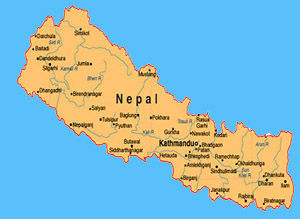Maoist anti-government protestors blockade Kathmandu
 Kathmandu - Nepal's former rebel Maoists imposed a blockade of the Kathmandu Valley Tuesday as part of an anti-government protest.
Kathmandu - Nepal's former rebel Maoists imposed a blockade of the Kathmandu Valley Tuesday as part of an anti-government protest.
Maoist cadres sat on highways at several entry points into the valley, effectively cutting off the capital from rest of the country.
"Hundreds of Maoist activists have shut down the highways and other link roads leading in and out of the Kathmandu Valley," the Kathmandu police office said. "The blockade has been total, and no vehicles have entered Kathmandu from anywhere."
The Maoist blockade stranded thousands of people trying to enter or leave Kathmandu.
"I need to go home urgently but am stuck here," Purusottam Pokharel said as he watched Maoist demonstrators sitting across the highway at the Thankot entry point in the western part of the valley.
"It may not be possible to leave today because the Maoists have put up roadblocks on other parts of the highway as well," Pokharel said.
The Maoists had originally planned to blockade Kathmandu international airport as well but changed their plans after coming under intense pressure from the international community.
The Maoist protest has been peaceful so far.
The blockade was the latest in a series of anti-government protests announced by the Maoists since their government collapsed in a power struggle with President Ram Baran Yadav nearly six months ago.
The power struggle centred on the sacking of the army chief by the Maoist-led government in May, a decision that was annulled by the president hours later.
The Maoists are demanding parliament debate the president's action, but other parties in the government have rejected the idea.
The Maoists said the sacking of army chief Rupmangat Katuwal was an attempt to restore civilian control over the army, which had been made difficult by the army chief's refusal to follow orders.
However, other parties, including the moderate Communist Party of Nepal-Unified Marxist Leninist, which was part of the Maoist-led coalition, said the sacking was an attempt by the Maoists to tighten their hold on power and withdrew its support.
The Maoists emerged as the single largest party in the April 2008 elections but fell well short of an outright majority.
A new coalition government took office after the fall of the Maoist government and has come under growing attacks from the Maoists. (dpa)